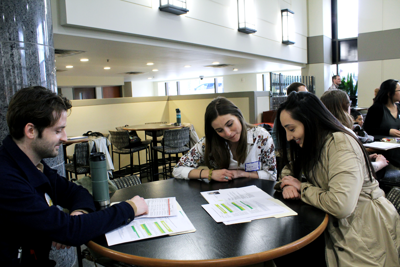Western Michigan University students gained the support of several Michigan lawmakers for a policy that would allow solar panels to be built on agricultural reserve land on Wednesday, April 10.
The students were in Lansing as a part of the university’s environmental policy class. Throughout the day, students met with more than 40 lawmakers and lobbied in favor of amending PA 116, a law that provides tax incentives for building wind turbines or cell phone towers on agricultural reserve land. The law currently does not include provisions for solar panels; the class hopes that their efforts might change that.
“A lot of these reps, they don’t even know what PA 116 is,” said Sterling Ladd, one of the students involved in the class. “So we kind of have to be the ones to catch them up to speed and explain what it is. Then, on top of that, we then have to convince them why it needs to change.”
During their time in Lansing, the students were able to persuade three lawmakers to sponsor the policy change. Aside from those legislators, after the meetings students said that a fair amount of legislators seemed supportive of the change, but said that they would have to do more research on their end before committing.
Students were not surprised to find some lawmakers dismissing the need for a change. What did come as a surprise, however, was Rep. Steve Johnson’s response. Johnson, a Republican serving in his first term as representative, said that he was opposed to the premise of PA 116 in the first place.
“It was one of the first meetings we had,” said Carolyn Sacha, one of the student’s who met with Johnson. “I was nervous, but in the back of my mind I knew we were prepared and ready to go, but someone being opposed to PA 116 is something that we never even considered.”
Sacha said that the PA 116 has been around for so long that the thought of a lawmaker opposing it hadn’t crossed her mind.
After lunch, students were again met with challenges during their meeting with Rep. Matt Maddock. Also Republican serving in his first term, Sterling Ladd said that Maddock seemed to be misinformed on what PA 116 actually entails.
“He kept bringing up education,” Ladd said. “He said he was concerned about money. That this change would take money away from the schools. PA 116 is about agriculture tax breaks, it already exists, we’re just asking to give those farmers who use it a choice. It shouldn’t and doesn’t affect the budget in the way he was concerned about.”
Ladd said that since the PA 116 can help farmers earn income on unused fields, the changes in revenue would be negligible at the state level.
Around the time of the meeting with Maddock, other students were meeting with members of Gov. Gretchen Whitmer’s administration. Kara Cook, a policy advisor to the governor, said that the governor is currently looking into changing the way that PA 116 is handled administratively so as to allow solar panels.
“We believe that the change can be made administratively instead of statutorily,” Cook said. “We believe that we can allow solar panels without legislative change, and I actually have meetings scheduled with other members of the administration to make sure that we all understand this correctly.”
Cook said that changing the matter administratively could help avoid any roadblocks in the legislature. Doing so, however, brings with it a risk that the next administration could reverse the decision, she said.
“There’s still a place for statutory changes,” Cook said. “Statutory changes bring with them longevity in policy. If it’s in the letter of the law then it becomes law, not just this administration’s policy.”
Cook said that while the administration continues to look toward non legislative methods of change, they are open to working with the legislature should the students’ lobbying attempts bear fruit.
After the meeting, the students were given floor recognition in the House of Representatives by Rep. John Hoadley.
While some lawmakers were less enthusiastic than others about the proposed change, students by and large said that they felt the day was a success.
“It went good, it went really good,” said Reality Rojas, one of the first students to meet with a legislator. “I went in not knowing what to expect but, in the end, I think we actually accomplished something.”
The class left Lansing around 3:30 p.m. that afternoon. Many of the students said that the experience left them with a better understanding of both environmental policy and the law-making process in general.
The story of the proposed change does not end there. The change has been supported by the Michigan Environmental Council, who worked closely with the environmental policy class, and legislators now educated on the topic could eventually introduce it. The issue lies in introducing the change in the proper committee and having it survive the committee process said Myles Eldred. Despite this, he said that he believes the event had an impact.
“Most of the people we met with seemed pretty supportive of the idea,” Eldred said. “I think it was a pretty productive day.”







(0) comments
Welcome to the discussion.
Log In
Keep it Clean. Please avoid obscene, vulgar, lewd, racist or sexually-oriented language.
PLEASE TURN OFF YOUR CAPS LOCK.
Don't Threaten. Threats of harming another person will not be tolerated.
Be Truthful. Don't knowingly lie about anyone or anything.
Be Nice. No racism, sexism or any sort of -ism that is degrading to another person.
Be Proactive. Use the 'Report' link on each comment to let us know of abusive posts.
Share with Us. We'd love to hear eyewitness accounts, the history behind an article.